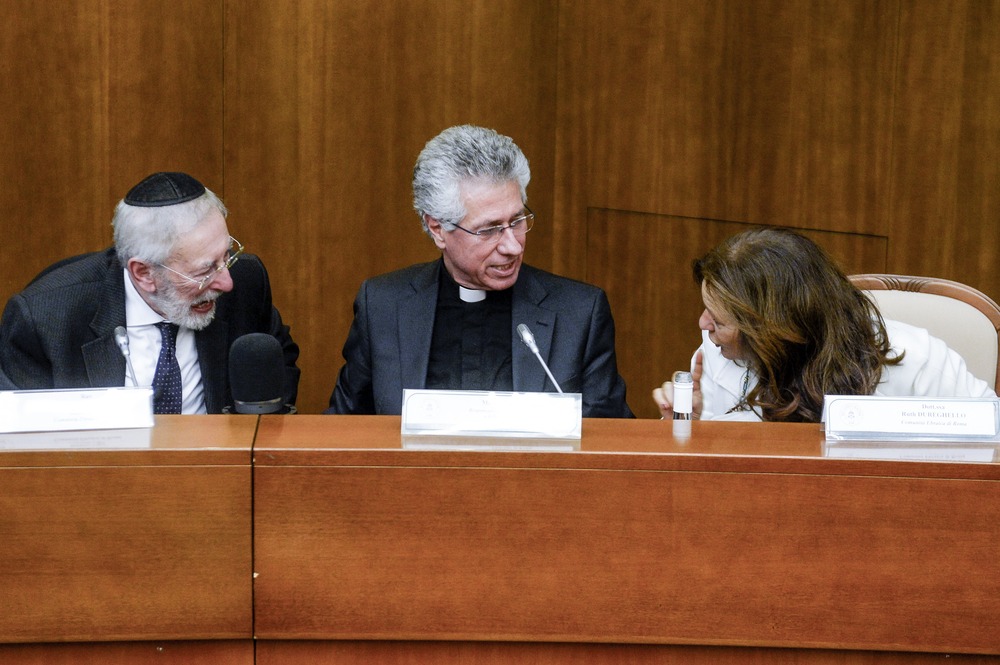
Rabbi Riccardo Di Segni, the chief rabbi of Rome, Father Marco Gnavi, director of ecumenical and interreligious affairs for the Diocese of Rome, and Ruth Dureghello, former president of Rome's Jewish community, speak Jan. 16, 2025, during a meeting at Rome's Pontifical Lateran University. (CNS/Cristian Gennari)
The chief rabbi of Rome said Christian-Jewish dialogue has been a victim of the war unleashed with the Hamas attack on Israel in October 2023.
"The moment we are living in is one in which it seems that the church is again giving in to the temptation to cut ties with Judaism," Rabbi Riccardo Di Segni, the chief rabbi of Rome, said Jan. 16 during a meeting at Rome's Pontifical Lateran University.
The rabbi accused Pope Francis of fueling anti-Israeli and anti-Jewish sentiments by focusing on the suffering of Palestinians in Gaza and not acknowledging the multiple threats to Israel's existence.
Rabbi Di Segni said it was a case of "selective indignation."
Father Marco Gnavi, director of the diocese's office for ecumenical and interreligious dialogue and host of the meeting, told Rabbi Di Segni, "I do not believe it is true that the pope is silent about some of the horrors of our day," including the barbarity of the Hamas attack on Israel and their continued holding of hostages as well as more widespread threats against Israel.
Speaking at an annual meeting to promote Catholic-Jewish dialogue in the Diocese of Rome, the rabbi quoted a writer who said, "A pope cannot divide the world into children and stepchildren and therefore must denounce the suffering of all."
"I fully agree," the rabbi said. "But that is precisely what the pope does not do."
Father Marco Gnavi, director of the diocese's office for ecumenical and interreligious dialogue and host of the meeting, told Rabbi Di Segni, "I do not believe it is true that the pope is silent about some of the horrors of our day," including the barbarity of the Hamas attack on Israel and their continued holding of hostages as well as more widespread threats against Israel.
"You can't ask us not to suffer both with you and with others," Gnavi said.
In addition, Gnavi said, criticizing Israel's military actions in Gaza does not mean questioning Israel's right to exist or to defend itself, although he said Catholics must take care not to cross a line that could feed into anti-Israeli or anti-Jewish propaganda.
Insisting that the only "enemy is hatred," the priest said Catholics and Jews must continue their dialogue and their efforts to learn more about each other and to share that knowledge with younger generations of Catholics and Jews.
Advertisement
Rabbi Di Segni said that while he believes the Catholic-Jewish relationship is "a dialogue that has been ruined for months," he also insisted that "for those who believe, dialogue is not and cannot be something trivial to interrupt."
In his speech Jan. 9 to diplomats accredited to the Holy See, Francis had renewed his call for a cease-fire, which may go into effect Jan. 19, and he called again for the release of the hostages.
But the pope also spoke about "Gaza, where there is a very serious and shameful humanitarian situation."
"My prayerful hope is that Israelis and Palestinians can rebuild the bridges of dialogue and mutual trust, starting with the smallest, so that future generations can live side by side in the two states, in peace and security."






